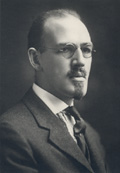George H. Bishop
| Read Transcript |
|---|
Listen to Interview |
|
Option 1 Download and open the audio file using your browser’s default media player. Audio interviews are presented in the MP3 audio format and may be accessed using QuickTime, Windows Media Player, or RealPlayer. Some audio files are very large and may take several minutes to load. Download Interview (9 MB) |
|
Option 2 Use the MP3 Flash Player below to listen to the interview. If you do not see the player, you do not have the Flash Player installed. Click here to install.
Click on the right arrow to start. (If you are using Internet Explorer you may have to click on the arrow twice to start the player.) |
Please note: The Becker Medical Library presents this oral history interview as part of the record of the past. This primary historical resource may reflect the attitudes, perspectives, and beliefs of different times and of the interviewee. The Becker Medical Library does not endorse the views expressed in this interview, which may contain materials offensive to some users.

